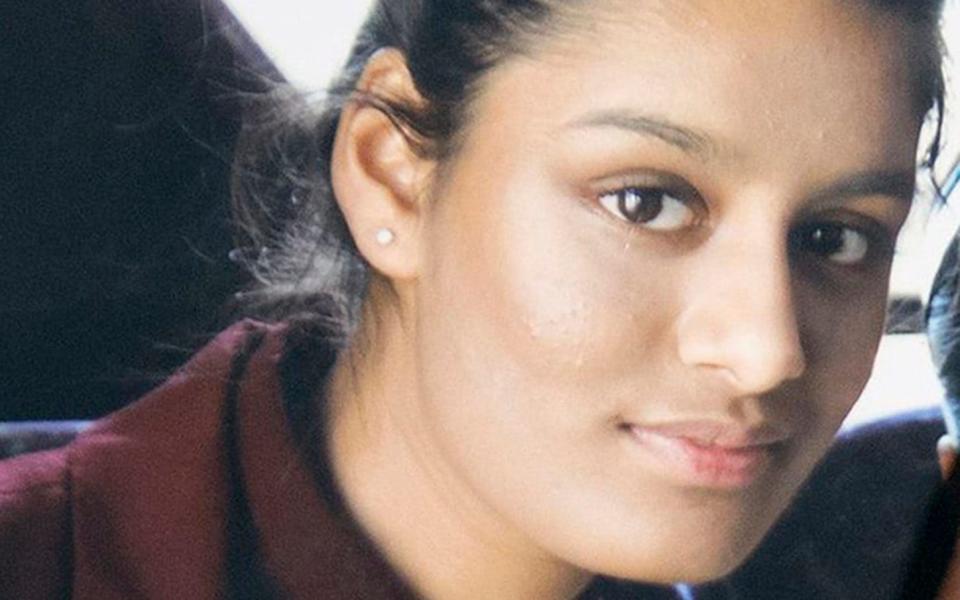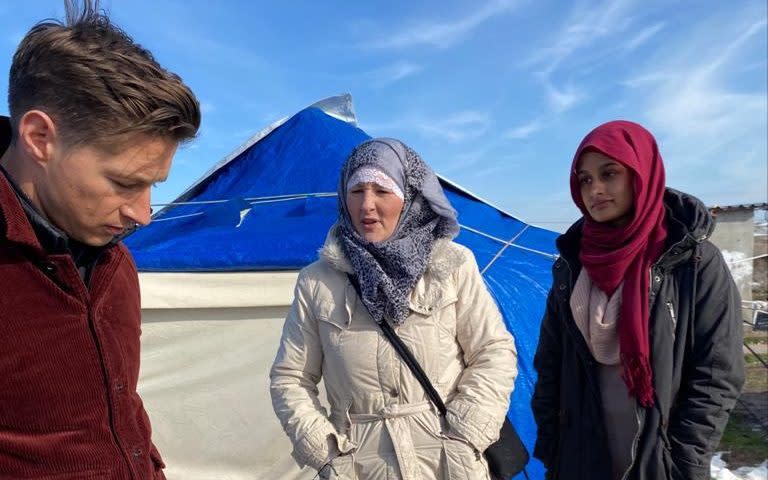Shamima Begum wins right to return to UK to challenge stripping of citizenship

Shamima Begum should be allowed to return to the UK to challenge the deprivation of her British citizenship, senior judges have ruled.
Ms Begum - one of three east London schoolgirls who travelled to Syria to join the so-called Islamic State group (IS) - travelled to Syria in February 2015 and lived under IS rule for more than three years before she was found, nine months pregnant, in a Syrian refugee camp in February last year.
Then home secretary Sajid Javid revoked her British citizenship on national security grounds later that month.
Ms Begum, now 20, took legal action against the Home Office, claiming the decision was unlawful because it rendered her stateless and exposed her to a real risk of death or inhuman and degrading treatment.
On Thursday morning Lord Justice Flaux, Lady Justice King and Lord Justice Singh ruled that Ms Begum should be allowed to return to the UK to pursue her appeal, albeit subject to controls imposed by the Secretary of State.
The tribunal also found that she "cannot play any meaningful part in her appeal and that, to that extent, the appeal will not be fair and effective", but ruled that "it does not follow that her appeal succeeds".
On Thursday, the Court of Appeal ruled that "the only way in which she can have a fair and effective appeal is to be permitted to come into the United Kingdom to pursue her appeal".
Lord Justice Flaux said: "Fairness and justice must, on the facts of this case, outweigh the national security concerns, so that the leave to enter appeals should be allowed."
The judge found that "the national security concerns about her could be addressed and managed if she returns to the United Kingdom".
In its ruling, the court said: "If the Security Service and the Director of Public Prosecutions consider that the evidence and public interest tests for a prosecution for terrorist offences are met, she could be arrested and charged upon her arrival in the United Kingdom and remanded in custody pending trial."
Lord Justice Flaux also said: "With due respect to SIAC (the Special Immigration Appeals Commission), it is unthinkable that, having concluded that Ms Begum could not take any meaningful part in her appeal so that it could not be fair and effective, she should have to continue with her appeal nonetheless."
He added: "It is difficult to conceive of any case where a court or tribunal has said we cannot hold a fair trial, but we are going to go on anyway."
In February SIAC - a specialist tribunal which hears challenges to decisions to remove someone's British citizenship on national security grounds - ruled the decision was lawful as Ms Begum was "a citizen of Bangladesh by descent" at the time of the decision.
The tribunal also found that she "cannot play any meaningful part in her appeal and that, to that extent, the appeal will not be fair and effective", but ruled that "it does not follow that her appeal succeeds".
Ms Begum's challenge to the Home Office's decision to refuse to allow her to enter the UK to effectively pursue her appeal was also rejected.
In June, Ms Begum's barrister Tom Hickman QC told the Court of Appeal that removing his client's British citizenship took away "the real possibility that she could return to the UK".
He said the decision had the result of "exposing her to ... the real risk of removal to Bangladesh or Iraq", where Ms Begum faced "extra-judicial killing at the hands of the police" or "a wholly unfair and predetermined 'trial' and an immediate sentence of death".

Despite the victory for Ms Begum the Home Office is planning to appeal the decision.
A Home Office spokesperson said: "This is a very disappointing decision by the Court. We will now apply for permission to appeal this judgment, and to stay its effects pending any onward appeal.
“The Government’s top priority remains maintaining our national security and keeping the public safe.”
The Government is "bitterly disappointed" by the court's ruling in the Shamima Begum case, Downing Street said. The Prime Minister's official spokesman said: "The Government's priority is maintaining our national security, and decisions to deprive individuals of their citizenship are not taken lightly.
"We will always ensure the safety and security of the UK and will not allow anything to jeopardise this."
Javid said: "First and most critically, allowing her - and indeed other terrorists - back into the UK to pursue an appeal would create a national security risk that cannot be fully mitigated, even with the diversion of significant resources."
He said the judgments and precedents set in the case could bind the hands of the Government in managing past and future cases.
And he warned allowing her to walk the streets would serve "as a lightning rod for both Islamist and far-right extremists".
Mr Javid said if Ms Begum did come to the UK it would prove impossible to subsequently remove her.
"I am therefore deeply concerned about this judgement. I welcome the decision of the home Office to seek to appeal it."
Shamima Begum's solicitor Daniel Furner, from Birnberg Peirce, said in a statement after the ruling: "The court's judgment today is an important reminder that fairness and the rule of law remain cornerstones of the British legal system and that they set the legal limits within which the Home Secretary may act.
"Justice cannot be defeated, or indefinitely delayed, because a case is difficult or because national security is engaged.
"Fundamental rights are not extinguished because a person is abroad, or because the allegations against them are serious.
"As important as the reiteration of those centuries-old principles was the court's unqualified rejection of the Home Secretary's argument that the impediments to Ms Begum's participation in her appeal were of her own making.
"As the court said, approaching the case on that basis risks putting the cart before the horse.
"Ms Begum has never had a fair opportunity to give her side of the story. The court itself noted the 'obvious' difference between interviews given to journalists, and instructions provided to a solicitor in court proceedings.
"Ms Begum is not afraid of facing British justice, she welcomes it. But the stripping of her citizenship without a chance to clear her name is not justice - it is the opposite."
At the hearing last month, Mr Hickman said Mr Javid had been informed that Ms Begum could not have a fair or effective appeal when he took the decision to revoke her citizenship.
Mr Hickman pointed out that Ms Begum, who remains in the al-Roj camp in Syria, was only 15 when she left the UK, saying: "She had not even taken her GCSE exams."
Sir James Eadie QC, representing the Home Office, said: "The fact that the appellant could not fully engage with the statutory appeal procedure was a result of her decision to leave the UK, travel to Syria against Foreign and Commonwealth Office advice and align with ISIL.

"This led to her being held in conditions akin to detention in a foreign state at the hands of a third party, the Syrian Defence Force.
"It was not the result of any action by the secretary of state and the deprivation decision did not have any causative impact on the appellant in this respect."
Ms Begum was one of three schoolgirls from Bethnal Green Academy who left their homes and families to join IS, shortly after Sharmeena Begum - who is no relation - travelled to Syria in December 2014.
Kadiza Sultana and Amira Abase, then 16 and 15 respectively, and Ms Begum boarded a flight from Gatwick Airport to Istanbul, Turkey, on February 17 2015, before making their way to Raqqa in Syria.
Ms Begum claims she married Dutch convert Yago Riedijk 10 days after arriving in IS territory, with all three of her school friends also reportedly marrying foreign IS fighters.
She told The Times last February that she left Raqqa in January 2017 with her husband but her children, a one-year-old girl and a three-month-old boy, had both since died.
Her third child died shortly after he was born.

 Yahoo News
Yahoo News 